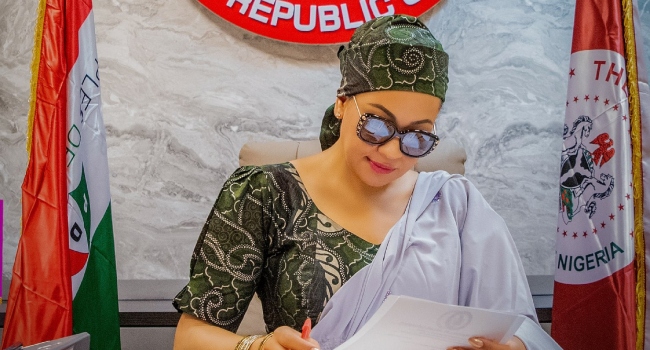The Independent National Electoral Commission (INEC) has commenced verifying signatures submitted in a recall petition against Senator Natasha Akpoti-Uduaghan, who represents the Kogi Central Senatorial District.
If the petition meets the required threshold, INEC will conduct a referendum within 90 days to determine whether the suspended senator will remain in office.
The Recall Petition and INEC’s Role
Last week, constituents from Kogi Central formally submitted the recall petition, which alleges “loss of confidence” in Akpoti-Uduaghan and accuses her of gross misconduct, abuse of office, and deceit.
The petition is backed by signatures reportedly gathered from over half of the 474,554 registered voters across the five local government areas in the senatorial district: Adavi, Ajaokuta, Ogori/Magongo, Okehi, and Okene.
INEC has now begun verifying the authenticity of the signatures, a critical step before proceeding with a referendum. According to the Electoral Commission’s Regulations and Guidelines for Recall 2024, a recall referendum will only be conducted if more than half of the registered voters in the constituency sign the petition. If the threshold is met, INEC will issue a public notice detailing the referendum’s time, date, and location. However, if the petition fails verification, a public notice will be issued stating that the recall process will not proceed.
This process underscores the importance of public participation in Nigeria’s democratic system, allowing constituents to hold their elected representatives accountable. However, it also highlights the complexities involved in the recall process, which has rarely been successful in the country’s political history.
Suspension and Political Controversy
Akpoti-Uduaghan, a vocal politician and member of the Peoples Democratic Party (PDP), was suspended from the Senate on March 6 for alleged “gross misconduct” following a heated disagreement with Senate President Godswill Akpabio. Her suspension has been a topic of intense debate, with her supporters claiming political persecution while her opponents insist on accountability.
The recall process has intensified political tensions in Kogi Central, with some observers seeing it as a test case for Nigeria’s democratic institutions. The senator’s legal team has not yet made a formal statement, but political analysts suggest she may challenge the process in court if the referendum moves forward.
Her supporters argue that the recall is politically motivated and engineered by opposition forces who fear her growing influence in Kogi politics. On the other hand, her critics insist that the move is a legitimate expression of voter dissatisfaction and a necessary step to uphold accountability.
Challenges of the Recall Process
Nigeria’s recall process has historically been difficult to complete due to the complexities involved in collecting and verifying signatures. The Executive Director of the Centre for Anti-Corruption and Open Leadership, Debo Adeniran, noted that “previous recall attempts have failed largely due to the difficulty of meeting INEC’s requirements. However, this case presents a unique situation given the controversy surrounding Akpoti-Uduaghan’s suspension.”
Adeniran emphasized the need for legislative reforms to simplify the recall process, arguing that democratic values should allow constituents to remove underperforming officials with ease. “The National Assembly must take the lead in enacting laws that streamline the recall process, ensuring that it is effective at all levels of governance,” he added.
Similarly, the Executive Director of the Civil Society Legislative Advocacy Centre, Auwal Rafsanjani, called for a “national debate on the recall process,” advocating for a legal framework that ensures recalls are based on legitimate grounds, such as corruption, human rights abuses, or failure to perform duties.
Experts argue that the recall process should be refined to strike a balance between preventing frivolous petitions and ensuring that constituents have a legitimate mechanism to remove underperforming representatives.
In many democracies, recalls are triggered by clear violations of public trust, but Nigeria’s process remains cumbersome and largely untested.
Next Steps and Possible Outcomes
The next few weeks will be crucial in determining the fate of the recall effort. If the petition passes the verification stage, INEC will set a date for the referendum, where registered voters in Kogi Central will decide whether Akpoti-Uduaghan should be removed from office.
If the recall is successful, Kogi Central will have to conduct a fresh election to fill the senatorial seat.
However, if the referendum fails, Akpoti-Uduaghan will retain her position in the Senate, potentially strengthening her political influence.
Political watchers say this case could set a precedent for future recall efforts in Nigeria, testing the country’s electoral laws and democratic processes.
As INEC continues its verification process, the nation watches closely to see whether this attempt will succeed where many others have failed.
The recall process could also have broader implications for the political landscape in Kogi State and beyond. A successful recall would send a strong message about voter power and accountability, potentially encouraging similar efforts in other constituencies.
On the other hand, a failed recall could reinforce the perception that Nigeria’s political system is resistant to change.
Regardless of the outcome, this case highlights the need for continued discussions about electoral reforms in Nigeria.
Experts have called for a review of the recall process to make it more transparent, accessible, and efficient while ensuring that it remains a tool for genuine democratic accountability rather than political manipulation.
As INEC moves forward with its verification process, all eyes remain on Kogi Central, where the political future of one of Nigeria’s most outspoken senators hangs in the balance.
The coming months will determine whether this recall effort will be remembered as a milestone in Nigeria’s democratic evolution or yet another failed attempt at electoral accountability

